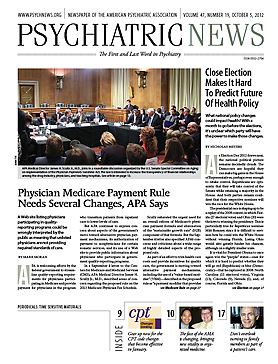Two recent studies have sought to clarify the foggy relationship between delirium and dementia.
In the first, published July 5 in the New England Journal of Medicine, Jane Saczynski, Ph.D., an assistant professor of medicine in the Division of Geriatric Medicine at the University of Massachusetts Medical School, and colleagues examined postoperative delirium and the cognitive trajectory during the first year after cardiac surgery.
They performed preoperative and postoperative evaluations of 225 patients aged 60 or older who underwent coronary-artery bypass grafting or valve replacement. They assessed subjects’ cognitive function using the Mini-Mental State Examination (MMSE), and delirium was diagnosed using the Confusion Assessment Method.
They found that the 103 participants (46 percent) in whom delirium developed postoperatively had lower pre-operative MMSE scores than did those who did not develop delirium. In addition, that delirium was associated with a significant decline in cognitive ability during the first year after cardiac surgery and showed a trajectory characterized by an initial decline and prolonged impairment.
Saczynski and her colleagues noted that they were able to identify a lower level of cognitive function at baseline in the group with postoperative delirium that may have been related to a greater burden of preexisting disease. They acknowledged that postoperative cognitive decline in patients with delirium may be the continuation of decline that began before surgery. “Nonetheless, our findings suggest that the development of postoperative delirium should be added to the list of risk factors for prolonged impairment after cardiac surgery,” they said.
Researchers based at the Department of Public Health and Primary Care at England’s University of Cambridge considered many of the same questions as Saczynski and colleagues in a study published in the August 9 Brain Advance Access. Daniel Davis, M.B., Ch.B., and colleagues said their intent was to determine whether delirium increases the risk of incident dementia and whether—in those with dementia—a history of delirium is associated with increased neuropathology markers of dementia.
“As a geriatrician, I see lots of frailty,” Davis told Psychiatric News. “When frail systems are put under stress, failure occurs at the weakest point. Delirium is a key manifestation of cognitive frailty, so I thought it was natural to investigate the longer-term outcomes of delirium. Colleagues, patients, and relatives told me they were never ‘quite right’ after an episode in the hospital. The classical dogma on delirium and dementia is that they are entirely separate clinical conditions, but if there is indeed a link, the pathophysiological substrates are completely unknown, perhaps even more surprising given how common delirium and dementia both are.”
Davis and colleagues used data from the Vantaa 85+ study, a population-based cohort study of 553 individuals aged 85 or older at baseline who were then assessed after three, five, eight, and 10 years. This study, they said, is of one of only six population-based cohorts with neuropathology information and the only one to have ascertained delirium. The burden of standard dementia-related neuropathology markers in individuals with and without a history of delirium was also examined, using autopsy data.
The study confirmed that delirium is associated with general cognitive decline, with an eight-fold increase in incident dementia and accelerated decline in MMSE scores.
But perhaps most intriguing were the neuropathological findings: Individuals with dementia and no history of delirium had strong associations with Alzheimer-type infarct and Lewy body pathologies. In contrast, those with dementia and a history of delirium showed no such relationships.
The researchers noted that the study was not powered to determine if delirium is genuinely associated with an altered pattern of pathology, but “we are analyzing cognitive data in two further population-based cohort studies (the MRC Cognitive Function and Aging Study and the Cambridge City Over 75 Cohort) in relation to their hospitalizations and findings at autopsy,” explained Davis. “These cohort studies sampled from the general population (including the Vantaa cohort) hold data from nearly 1,000 brain donors and provide a unique opportunity to study the relative contribution of acute illness to cognition and neuropathology.”
It is clear that both groups of researchers agree: The strong association of delirium with cognitive decline and dementia, even after adjusting for age, underscores the clinical importance of delirium in relation to dementia risk.
Future research is expected to include prospective delirium measures in cohort studies of dementia, correlating these with neuroimaging and neuropathology findings.

“Cognitive Trajectories After Postoperative Delirium” is posted at www.nejm.org/doi/full/10.1056/NEJMoa1112923. The study was funded by the Harvard Older Americans Independence Center and the National Institutes of Health. “Delirium is a Strong Risk Factor for Dementia in the Oldest-old: A Population-based Cohort Study” is posted at http://brain.oxfordjournals.org/content/early/2012/08/09/brain.aws190. The study was funded by the Wellcome Trust, Alzheimer Society, National Health and Medical Research Council of Australia, and Alzheimer Foundation of Finland, among others.

